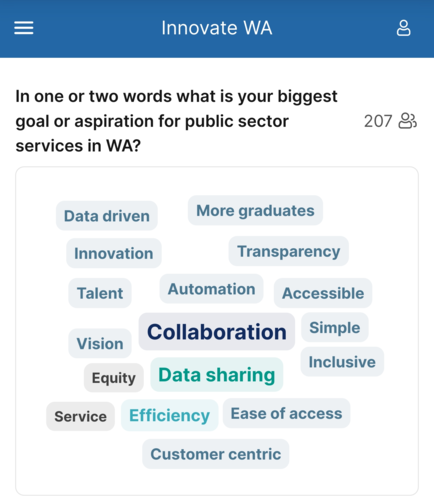Public Sector Network's Innovate WA conference today started with a poll amongst the attendees, asking for our biggest goal or aspiration for the public sector in Western Australia. Overwhelmingly, collaboration came out as the main opportunity for contributors and decision makers in the sector. Closely linked was the desire to better share data between government departments and functions. In his opening address, WA Minister for Innovation Stephen Dawson touched on that, mentioning the State Government is planning to introduce legislation later this year around privacy and responsible data sharing. This will be the first time WA government agencies and state-owned enterprises will be subject to privacy laws, and at the same time is hoped to encourage data sharing that should result in better outcomes for citizens of the state.

Figure 1: poll results
Greg Italiano, the state government's CIO, gave an update on the digital transformation of the WA government. Delivering a digital identity has been a key milestone so far - no easy task given the many arms of government at state and federal level that were involved. He acknowledged the Service WA app doesn't offer a compelling range of services to deal with government so far though - finding your best deal for refueling and notices on shark detections probably don't top the list of needs for many.
With an ability to digitally authenticate as yourself, many options now do exist for future enhancements. This was also the viewpoint of Hans Jayatissa, who spoke about the steps the Danish government has taken over the last 20 years that have brought the country to be the world leader in digital government.
All the focus on 'digital first' should not result in 'digital only' though, which came out strongly in a review of the blueprint to ensure digital inclusivity in government. To that end, it was great to hear several actions have been planned to help specific groups in society at risk of being left behind: people in regional communities, older people, Aboriginal communities, people from different cultural and linguistic backgrounds all have a range of reasons why they may be digitally excluded: lacking education on how to use IT, no access to devices like internet-connected phones or computers, lacking budgets to pay for connectivity, etc. A human-centered approach to digital inclusivity clearly brought out what to work on to ensure everyone will have a decent opportunity to access an increasingly digital world.
Giselle Rowe and Danielle Giles in their respective talks provided excellent advice on how to foster innovation in an organisation. The former listed out a range of factors for success - an understanding of 'what is in it for me', small steps, supportive leadership, innovation ambassadors all are enablers for changing business processes. The latter convinced the conference room of the power of simple 2 minute exercises like creating a portrait of the person you are working with without taking your eyes of them, or continuously asking 'who are you' as a variant of the '5 why technique' demonstrating how you need multiple attempts at answering the same question to get to a root truth.
Great to see such a focus on enabling and supporting innovation, not only to streamline access to government services, but also in the wider economy to help keep Australia shine on the world stage!
Posted on Wednesday 15 February 2023 at 17:04